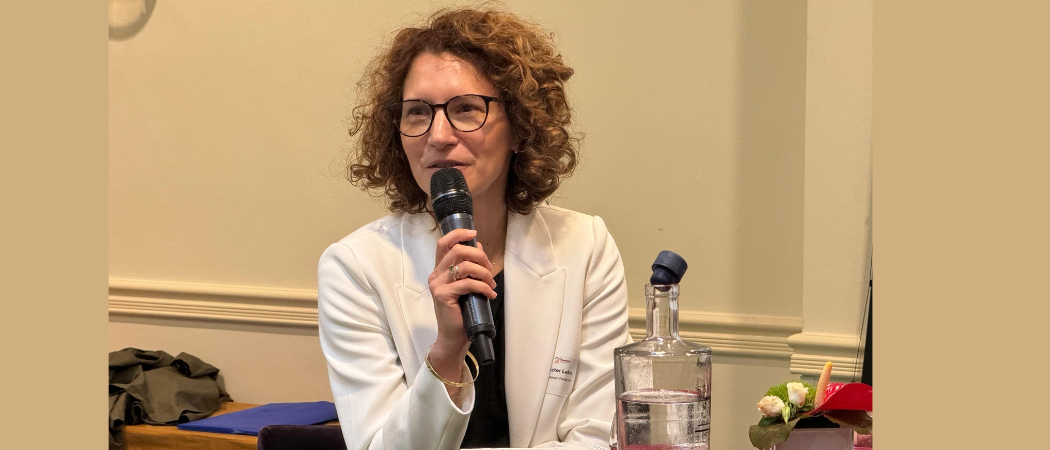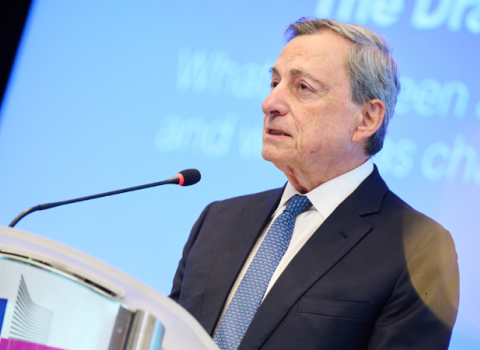New MEP agrees with Draghi’s call for more money for basic research, but not at the expense of big collaborative projects

MEP Eszter Lakos speaking during a Science|Business event held in Brussels, Belgium, on July 9, 2024. Photo credits: Eleonora Francica / Science|Business
Research and innovation is shaping up to have a central role in the EU’s new competitiveness agenda, but Hungarian MEP Eszter Lakos, who was involved in the negotiations for Horizon Europe, is worried about what this will mean for its successor scheme, framework programme 10 (FP10).
Her concern stems from uncertainty over the future of public-private partnerships in Horizon Europe’s pillar II, where the EU, member states and industry pool their efforts.
In his landmark report on EU competitiveness, former European Central Bank president Mario Draghi called for a research and innovation system based around an expanded European Research Council (ERC), which funds basic science, and European Innovation Council (EIC), which supports disruptive innovation.
“If you want to reinforce the ERC and the EIC, it will imply that the collaborative part of the framework programme will shrink, and this part should be preserved, because this is very much the core of the framework programme,” said Lakos, a former science and technology attaché in Brussels.
She was speaking to Science|Business before Commission President Ursula von der Leyen’s mission letter to future research commissioner Ekaterina Zaharieva was published. In it, von der Leyen pledged to expand the ERC and EIC, but made almost no mention of collaborative research. Lakos later reiterated her concerns about the future of Pillar II.
Overall, Draghi presents a “good assessment” of the challenges facing Europe, she said. One of the report’s key recommendations is to transform the EIC Pathfinder scheme into a new instrument modelled on the US advanced research project agencies, which make high-risk investments in innovation, overseen by expert programme managers who have significant independence.
“That was the aim of the EIC at the beginning,” Lakos notes. But the €10 billion innovation fund is not working exactly as imagined when it launched in 2021. “For instance, the risk taking is not at the level it was meant to be,” she said.
Good credentials
Following her election to the Parliament in June, Lakos plans to be active in FP10 discussions and other research and innovation files, whether she is chosen by her EPP group to be a rapporteur or not. EPP is not yet at the stage of assigning files.
“I think I have good credentials, because I have already negotiated a framework programme, and I also see the Council side and know very well how member states work,” Lakos said. In her role as science attaché, she represented Hungary in the negotiations for Horizon Europe.
Whoever leads FP10 negotiations for the Parliament will face an uphill battle convincing member states to agree to anything close to the €200 billion budget Draghi and others are asking for.
Lakos is not convinced national capitals will entertain calls to double the Horizon Europe budget. “At the end of the day, member states are checking how much they get back from the different programmes,” she said.
Finance ministries the Widening countries, which have low success rates in Horizon Europe, are especially likely to prioritise other programmes.
However, Lakos detects a shift in the narrative around research funding, and believes Draghi’s reputation means his recommendations could hold some sway. “I hope that also in the member states’ minds, the approach towards the framework programme is changing, because we have to be aware that competitiveness and productivity are very much rooted in research and innovation.”
Controversial instruments
The future of the Widening scheme will be a major point of contention in negotiations, with the Danish government calling for it to be moved out of the framework programme.
With its focus on the innovation gap between the EU and China and the US, rather than that which separates EU member states, the Draghi report makes no reference to Widening.
Lakos is not reading too much into this. “I do not think there could be a framework programme without focusing on the less well performing member states, or the Widening countries. I think they still need support,” she said.
Lakos is also ready to defend the European Institute of Innovation and Technology (EIT), which has faced its own calls for a merger with the EIC. “I very much appreciate the ecosystem approach of the EIT and the inclusiveness,” she said, citing the Regional Innovation Scheme (RIS) which aims to close the innovation gap between EU member states.
Other Horizon partnerships could draw inspiration from this model, she suggests. An independent report recently highlighted the added value the EIT brings, notably by fostering pan-European innovation ecosystems and by having a strong presence in less-developed regions.
The EIT is structured around nine knowledge and innovation communities (KICs) which are meant to become financially independent of the institute after 15 years. But Lakos argues the EIT should have a stronger role in directing the KICs and ensuring they have to deliver on certain requirements.
She is notably concerned that the KICs will turn away from activities that are not profitable, such as RIS. “If you have to be financially autonomous, of course you cut those activities that are not financially viable,” she said.
Also facing an uncertain future are the Horizon Europe missions. In 2021, the Commission pledged €1.9 billion to fund research towards achieving specific goals by 2030 on climate change, cancer, oceans and waters, climate-neutral and smart cities, and soil health, but critics say the missions are overly complex and should focus more on productivity growth and competitiveness.
Apart from the complex governance structure, one of the main issues with the missions is that they are financed almost entirely through Horizon Europe, Lakos says. “What I would like to see is that the framework programme gives a kickstart to the missions, and then money is chipping in from other programmes, from the private sector at a certain point as well,” she said.
This was the initial idea behind the missions, but Marc Lemaître, head of the EU research directorate, said last year the scheme was failing to attract the desired levels of outside funding.
Then there is the question of whether to allow military and dual use research in FP10. This should be subject to thorough debate, Lakos said. “In the past, I know that there were especially some member states that were very strictly against it, but the geopolitical situation has changed.”
Commercial technologies such as drones and artificial intelligence are already being weaponised in conflicts from Ukraine to Gaza. “Whether we want it or not, certain things are happening on the ground already,” she said.
Ukraine is also using Elon Musk’s Starlink satellite internet service to carry out military operations, and claims that the Russian army too is using Starlink, although the company denies selling to Russia.
For Lakos, this is a question of sovereignty and shows that developing space and satellite technologies should be high on Europe’s list of priorities. “In the case of Ukraine, we have a private company delivering this, and it’s a war between two nations,” she said. “It’s a very unique, first of a kind situation, and I hope Europe doesn’t want to end up there.”





 A unique international forum for public research organisations and companies to connect their external engagement with strategic interests around their R&D system.
A unique international forum for public research organisations and companies to connect their external engagement with strategic interests around their R&D system.